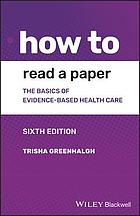
"A systematic review summarises the results of available carefully designed healthcare studies (controlled trials) and provides a high level of evidence on the effectiveness of healthcare interventions. Judgments may be made about the evidence and inform recommendations for healthcare".
Cochrane Collaboration
Cochrane Handbook
JBI (Joanna Briggs Institution)
JBI Manual for evidence synthesis
Campbell Collaboration
The Campbell Collaboration has a social science focus
High quality systematic reviews of complex questions can involve large teams of researchers and can take months or even years to complete. It is accepted good practice to have at least two researchers working on any systematic review to minimize bias in the selection of studies and the extraction of data.
The time you have available and whether you are working on your own will impact on the level of review that you can complete.
There are a range of other types of reviews including:
There is a useful summary of types of reviews from the PhD on Track web resource. This also has links to further reading about review types.
The revised edition of the Handbook offers the only guide on how to conduct, report and maintain a Cochrane Review.

A recommended book. See Chapter 2: Searching the literature.
Your Subject Librarian will be able to give advice on the following aspects of your Systematic Review:
For subject-specific support please contact your Subject Librarian.
Cochrane Handbook for Systematic Reviews of Interventions - key resource for those carrying out a Cochrane review and any other systematic review of interventions
Epistemonikos - database of evidence-based healthcare systematic reviews maintained by the Epistemonikos Foundation
JBI Manual for Evidence Synthesis - guidance for conducting a JBI systematic review
Campbell Collaboration - social science systematic reviews
PROSPERO - protocol register useful for searching for other reviews currently ongoing and to register your protocol
PRISMA Statement - reporting guidelines for a systematic review including a reporting checklist and a flow diagram for recording your search strategy
University of Bristol library subject guides - guides related to your subject area
CASP-UK - Critical Appraisal Skills Programme
CEBM has tools for evaluating RCTs, systematic reviews and diagnostics
Bristol Medical School short courses. - such as Introduction to Systematic Reviews and Meta-Analysis and Introduction to Network Meta-Analysis. There are also Materials and Recordings courses that are free of charge for University of Bristol staff members or Postgraduate Research students. They are ideal for self-paced learning, to dip into a new subject area or simply refresh your knowledge.